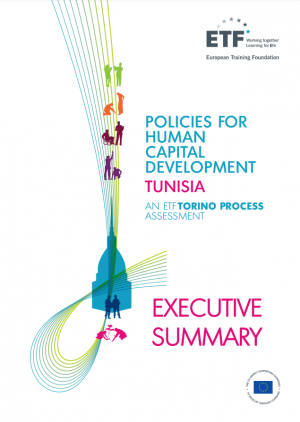This ETF assessment report on Human Capital Development in Tunisia forms part of the fifth round of the ETF Torino Process. Tunisia has been taking part in this process since 2010. Prior to this assessment, a series of self-assessments took place in Tunisia from 2018 to 2020. The Observatoire National de l'Emploi et des Qualifications (ONEQ: National Observatory for Employment and Qualifications) acted as the national coordinating body, bringing together VET stakeholders both at national and sub-national levels. As a result, a draft national Torino Process report 2020 (Zaibi, on behalf of MFPE and ONEQ, publication upcoming) and eight regional Torino Process reports[4] One report for each region participating in the IRADA programme (http://irada.com.tn/), namely Gabès, Médenine, Gafsa, Kasserine, Sfax, Sidi Bouzid, Bizerte and Jendouba.
were produced, the latter in close cooperation with the EU-funded IRADA programme.
The ETF assessment process included an extensive phase of desk research based on the national and regional reports, a literature review of relevant studies, gathering of statistical data and the preparation of an issue paper containing an overview of themes to be discussed in the present report.
Within the regional policy dialogue, the findings and recommendations of the ETF Torino Process assessment provide elements to inform future regional initiatives within the Southern and Eastern Mediterranean area, as well as the ongoing discussions on post-2020 programming. The findings of this report will also feed into the current dialogue, led by the Union for the Mediterranean and the European Commission, on monitoring the progress of the 2019 Ministerial Declaration on Employment and Labour that underlines a range of issues, including the importance of reforming education and training systems in a way that responds to the challenges presented by ensuring employment, employability, and decent work.[5] For the importance of investment in education, higher education and training systems, including VET, as well as lifelong reskilling and upskilling of workers to prepare them for constant changes in the world of work, see Ministerial Declaration on Employment and Labour, April 2019, p. 4.
A cross-country report will consolidate all the outcomes from the Southern and Eastern Mediterranean Torino Process assessments and will contribute to the monitoring and evaluation framework intended to be developed as a concrete output of the Declaration.[6] The labour ministers asked the Union for the Mediterranean Secretariat to coordinate, with the contribution of volunteering countries, the setting up of a framework for national monitoring processes, notably by organising meetings, providing relevant information, contact making and networking, as well as cooperating with countries' stakeholders and international organisations. The ministers invited the European Commission and the relevant EU agencies, in particular the ETF, to provide relevant expertise to this work. See the Ministerial Declaration on Employment and Labour, paragraph 29, April 2019.
The present assessment takes a broader perspective on human capital development in a lifelong learning perspective. After introducing the wider context (chapter 1), the assessment provides an overview of the key human capital development challenges in Tunisia (chapter 2). Chapter 3 concentrates on the VET system, as Tunisian employers demand skilled workers and technicians, and VET graduates stand better chances on the labour market. It elaborates on the two major challenges of external and internal consistency of the VET system and suggests recommendations for how these could be improved in the mid to long term. Chapter 4 provides a conclusion.
